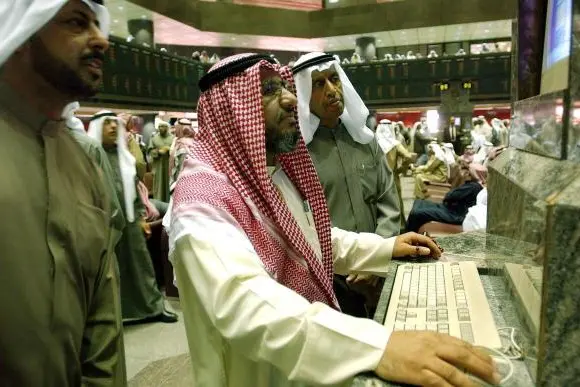PHOTO
The number of Gulf companies listing on public stock markets declined last year, as did the amount of money raised through initial public offerings (IPOs) of shares, a new report has shown.
A paper published earlier this week by Kuwait Asset Management Company (KAMCO) found that there were 18 listings of firms based in the Gulf Cooperation Council (GCC) last year, a 36 percent fall from the 28 IPOs in 2017. Moreover, the amount of capital raised through IPO proceeds also fell to $2.7 billion, down 18 percent from $3.3 billion a year earlier.
However, one significant change from the prior year is that "corporate IPOs led primary markets", as compared to 2017 when listings of new Real Estate Investment Trusts (REITs) dominated, particularly in Saudi Arabia.
Saudi Arabia was once again the most active country in the GCC in terms of the number of IPOs, with 11 of the 18 IPOs that took place occurring on the kingdom's markets. Eight of the 11 vehicles listed on the exchange were REITs, raising a combined $1.04 billion.
There were listings of firms from all six GCC countries, with the $754.5 million IPO of Qatar Aluminium, which took place in November, being the biggest primary market capital raising in 2018.
Bahrain had its first IPO for four years following the flotation of port operator APM Terminals Bahrain, which raised $31.5 million in December, and although there were no new listings on either the Abu Dhabi or Dubai exchanges, two UAE firms did achieve IPOs on international markets. RA International, a Dubai-based provider of temporary shelters and camps, raised $25 million through its float on London Stock Exchange's junior market, the Alternative Investment Market, in June, while oil & gas firm Shelf Drilling raised $226.1 million through a listing on the Oslo Exchange in Norway in the same month.
Globally, the number of IPOs dropped by 21 percent year-on-year to 1,359, KAMCO's report said, citing data from accountancy firm EY, although a number of huge listings pushed up overall transactions by 6 percent to $204.8 billion.
KAMCO's report said that although IPO activity has been higher in 2017 and 2018 than in the preceding couple of years, "corporate issuers continue to look for reduced volatility in oil prices, and a stable near-term outlook for secondary markets within the region" before launching IPOs.
Nishit Lakhotia, head of research at Bahrain-based investment bank SICO, said that IPO markets were not helped by the fact that markets "in the second half (of 2018) were more on the negative side".
"For example, the biggest market, Saudi Arabia, has been broadly falling, with limited investor appetite in (the) second half," he told Zawya in a telephone interview on Monday. He added that the decline in oil prices in the final quarter of the year also proved to be a disincentive, as well as the performance of the Dubai market, which was the GCC's worst-performing index last year, declining in value by around 25 percent.
"That doesn’t mean the same thing will happen this year," Lakhotia added. "This year, there can be a pick-up in IPOs, but sentiment first has to improve. Otherwise, if you have a choice, you would delay the IPO.
"Right now, if turnover has been declining in many of the markets, why would you want to do an IPO when there’s less activity? You generally do an IPO when the secondary market is robust, there’s lots of trading happening and the overall sentiment is good. That wasn’t really the case this year, especially in the second half."
Charles-Henry Monchau, a managing director within Dubai-based Al Mal Capital's investment management arm, said: "Generally, IPO activity picks up on back of sustained rally in stock markets – when asset prices are high, business owners are encouraged to raise capital/ cash out.
"In the Gulf, traditionally families have had capital requirements fulfilled through bank loans and have avoided going public - and the accompanying scrutiny," he told Zawya in an emailed response to questions on Monday.
"In the UAE, the law now requires a minimum 30 percent offer (versus 55 percent previously), so that is a positive. We do not think we would see a boom in IPOs anytime soon in the GCC, but decent transaction flow in a capital-deficit market like Egypt," he added.
Further reading:
- POLL-Mideast funds wary on 2019, will favour Saudi, Kuwaiti stocks
- Less is more: MENA IPO market still slow, but value of deals increases in Q3
- GCC IPOs go down in Q3 - report
- Delayed state offering stalls Egypt's surging share sales
- Float on: Advisors predict steady growth in region's IPO market
(Reporting by Michael Fahy; Editing by Shane McGinley)
Our Standards: The Thomson Reuters Trust Principles
Disclaimer: This article is provided for informational purposes only. The content does not provide tax, legal or investment advice or opinion regarding the suitability, value or profitability of any particular security, portfolio or investment strategy. Read our full disclaimer policy here.
© ZAWYA 2019





















